Lockdown: Wales 'on a knife edge' in dealing with pandemic
Wales is on a "knife edge" and easing restrictions too quickly could lead to the "exponential growth" of Covid-19, a government scientific adviser has said.
Cases could be kept low if alert level three restrictions are in place until June and schools reopen gradually, a report to the Welsh Government advises.
The Welsh government is expected to announce a "stay local" rule on Friday.
But First Minister Mark Drakeford told the i newspaper he did not see life returning to normal in 2021.
He said Boris Johnson's wish to fully lift restrictions by 21 June was "fanciful" and warned another wave is "inevitable".
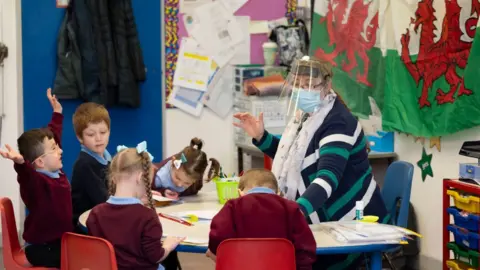 Getty Images
Getty ImagesThe report by the Welsh Government's Technical Advisory Cell (Tac) is based on modelling by scientists at Swansea University.
A rush to return to school, combined with a faster easing of restrictions, could lead to a larger third wave of cases, according to the report, which was published last month but made public on Thursday.
The TAC has said all the modelling and conclusions still apply.
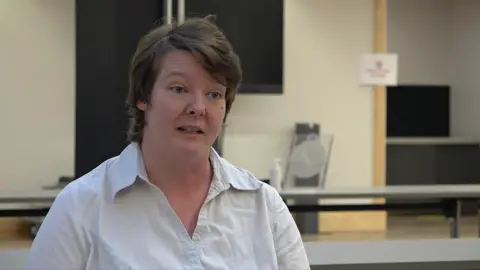
The co-chairwoman of the TAC, Fliss Bennee, said it was a crucial moment in the course of the pandemic.
"We are sitting at a knife edge, where if we start to unlock too fast then we will be in a period of exponential growth that could bring us easily back to the sort of levels of hospitalisations and deaths we saw in January," she said.
On Wednesday, UK chief medical adviser Prof Chris Whitty warned against easing lockdown too quickly.
The modelling is neither a prediction nor a forecast, but suggests the likely impact on infections, serious illness and death of the greater mixing allowed by the easing of restrictions.
In its report, TAC warns there remain "uncertainties" around the impact of school reopening on transmission, the population's adherence to social distancing and other precautions, as well as the impact of vaccines on transmission.
'Horizon more positive'
The report adds: "As the vaccine rollout continues, the horizon looks more positive in terms of expecting lower numbers of Covid-19 deaths than have been observed in November 2020 - January 2021."
Looking specifically at schools, the report says the gradual return of students should not lead to another wave of cases, hospitalisations or deaths as long as adherence with other restrictions remains high.
But if adherence wanes "there may be a resurgence of the virus around May-June time, especially if the new variant adds around an initial 0.6 to the R number", the report says.
R is the rate at which the virus spreads, and an R value above one indicates the epidemic is growing.
The report also warns against relying on vaccines alone to end the pandemic.
It says: "Vaccines are not 100% effective so not all at-risk groups are protected, even with full coverage.
"The modelled ratio of deaths to cases in May 2021 is around one quarter of the ratio in January 2021."
The scientists say that the results of the modelling "may reinforce the need to be cautious with loosening restrictions and monitor outcomes over time, if a further wave of cases, hospitalisations and deaths is to be avoided".
What exactly does the model suggest?
In a most likely scenario - assuming the new Kent virus variant is dominant, the vaccine is 75% effective and there is a cautious move out of lockdown - this could lead to 57,866 more Covid cases and about 800 deaths.
But a worst-case scenario - with a quick move out of lockdown, a bigger impact from the new variant and low adherence to the rules - could mean more than 194,000 further cases and almost 3,500 more deaths.

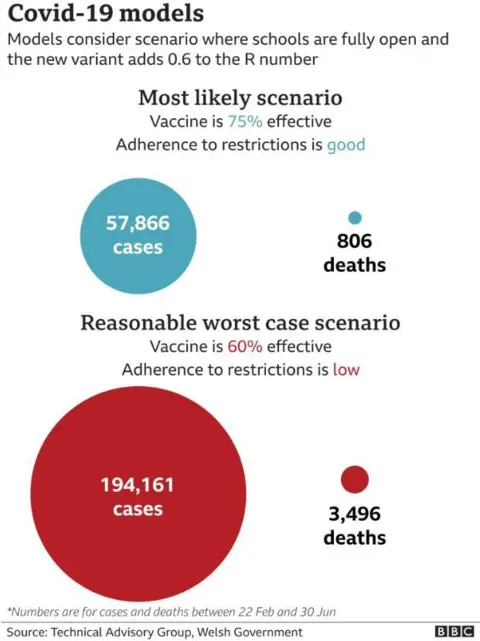

But even here, the vaccine would help mitigate what would otherwise be a worse third wave.
The scientific advisers say there is still some uncertainty about the effectiveness of the vaccine in how it may slow transmission.
There is also the issue that about a quarter of hospital admissions with Covid still involve people under 60 years old, so they are stressing that everyone still has a part to play in keeping to basic rules, especially before all adults have had the vaccine.
There is hope people now understand more about the virus, and scientists have noted how people were cautious in how they behaved after the end of the firebreak last November.
Ms Benee said when scientific advisers looked at the models, they told politicians they should unlock "really slowly and really carefully".
She added: "If we go cautiously, if we are able to keep transmission low enough, then there's no reason why we won't be able to avoid having a third wave during the summer entirely."
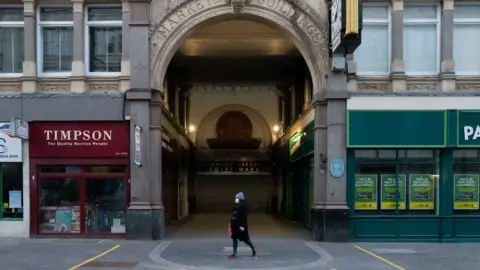 Getty Images
Getty ImagesWhere are we now?
The case rate in Wales as a whole was, for a period in December, one of the highest in the world. But it has been falling since the week before Christmas.
For more than a month, Wales has had the lowest case rate of the UK nations and is at its lowest level since 18 September.
At 43.9% it is below the "trigger" figure of 50 cases per 100,000, normally used as the guide for bringing in restrictions.
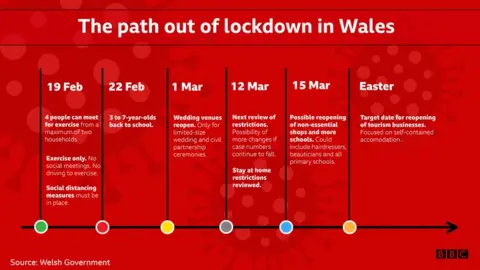
The youngest children have already returned to school in Wales, with all other primary school pupils due to go back on Monday.
Secondary schools will be able to welcome pupils in years 7, 8 and 9 for "check-in" sessions before they are due back fully from mid-April.
Exercise rules were eased on 20 February to allow four people from a maximum of two households to meet outdoors for exercise.
First Minister Mark Drakeford previously said chief medical officer Frank Atherton had told him he believed a third wave was being "baked into what will happen during this year".
